#neutralising role
Text
thinking about zoro being the crew's main protector.
it’s quite literally his role amongst the straw hats; luffy's captain, usopp's their sniper, sanji cooks, nami navigates, chopper's their doctor, franky's their shipwright, jinbei's their helmsman and brook's their musician but zoro? zoro's their swordsman. zoro’s their guardian. his job is to be the first line of defense and protect everybody else so they can focus on doing their own thing and sure, none of them really need protecting— but they don't have to worry about defending themselves, either, because whoever they can't or don't want to handle zoro will finish up (if he hasn't gotten to them first).
like imagine a bunch of idiots cornering one of the crew (bad idea.) and picking nami because she's the woman without a devil fruit, as opposed to robin (BAD idea.). they've got her surrounded in the dead end of an alleyway and have somehow neutralised her clima-tact and she’s not worried, she’s not.
but against twelve men and with her weapon essentially now just a regular staff, she might be panicking. just a little. she’s gotten a couple of them good enough that they’re down for the count before a chain wrapped around her ankle trips her. it pulls at enough memories, faded but never forgotten, to bring up a sickening wave of fear and anger— and nami decides that she’s had enough of the bullshit.
she takes a deep breath and screams. “ZORO!”
the silence afterwards is deafening. the wind shifts, gently lifting the pieces of hair stuck to her sweaty face, and the men laugh uneasily. one of them yanks hard on the chain and she spits at him, heels scrabbling against the dusty ground even as he starts reeling her in like a fish on a hook. “he can’t hear you, little missy,” he snickers, grin widening the longer nobody shows up.
it’s still on his face when his head slides right off his neck.
blood sprays right before his body crumples like a doll. it takes a second for the others to realise and then the screaming starts— none of them get any farther than three steps before zoro’s cutting them down, swift swings of his sword and almost surgically precise slices rendering them incapacitated if not plain dead.
“sorry i’m late, witch.” the swordsman’s breathing hard, gore dripping off his blades even as he arcs one down and snaps the chain off nami’s leg with a growl. “did they hurt you?”
“no. no, i’m fine,” nami breathes, her smile quivering just a little— not because she’s shaken, no. because she’s pissed.
zoro’s voice is gruff as always, but his hands are careful if not outright gentle as he kneels to inspect her ankle before pulling her to her feet. “stay close,” he mutters, making sure that she’s nodded before cutting them a path through the fray. they bump into chopper next, and the doctor’s out cold over zoro’s shoulder in his regular form by the time sanji joins them to guard their flank. nami’s taken to just using her clima-tact as a bat for now, and it’s admittedly efficient.
she knew zoro would come. he always does. for all that they bicker and snip at each other, zoro has always protected his crew— even when said crew was just three people on what could barely be called a boat. he’d fought for her at arlong park and he fights for her now, his sword slicing over her head at an enemy she can’t see as she ducks low to jam her staff into another’s stomach.
they’ve moved closer to their ship when they find jinbei, then robin, then usopp, then brook and franky, and then zoro’s yelling luff, time to go! and their captain’s launching them all back onto the Sunny with a gleeful cackle that makes nami wheeze a laugh as they land in a mildly painful pile of limbs. somebody’s elbow digs into her ribs and she’s pretty sure that’s sanji’s bony kneecap pressed into her lower back. the swordsman swears as he sets about trying to pry them all apart and luffy seems to be actively fighting him, based on how his cursing’s getting more and more colourful.
behind them, their enemies burn, sliced to pieces. they debrief in the galley and zoro refuses to come away from the door until nami drags him by the ear and sanji threatens to personally shove dessert down his throat. they both know it’s because zoro’s still guarding them from a threat that doesn’t exist anymore.
they know he pretends not to care as much as he does. they know he keeps his words blunt and his swords sharp, but zoro lets luffy hang off him, unfazed, and makes a marginal effort to stick to nami’s budget even when he’s getting booze, and he eats his dessert. every last bit. he lets usopp fire moving targets to slice through so they can both practice. he keeps collateral damage when sparring with sanji to a minimum. he stitches whoever needs it up himself when chopper’s a little too tired.
and when his crew calls, he answers.
(now with a part from nami’s pov!)
#idk what this is#it was SUPPOSED to be a much angstier scene with nami getting borderline tortured before she cracks and screams for help#and zoro comes in swords blazing in full demon mode because how fucking dare. how dare someone touch his nakama#but i’ll spare you guys the pain (unless yall actually want me to write it lmao)#but also i love!! romance dawn trio!!#one piece#roronoa zoro#zoro#one piece zoro#strawhat pirates#straw hat pirates#mugiwara crew#nami and zoro are textbook wlw mlm solidarity but also#their friendship is something so special to me
376 notes
·
View notes
Text
An overlay of games
Two injured arms? What are you trying to tell us, Fujimoto ?
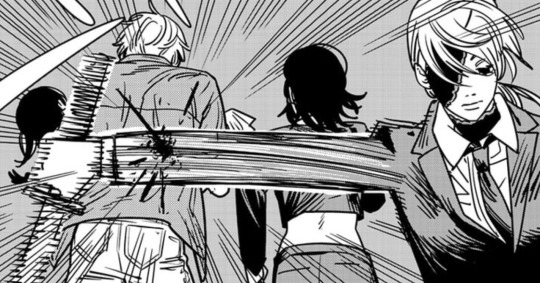

The interesting thing about the first part of the chapter is this page in which Denji hesitantly answers. It's another way of accentuating his existential crisis, even when he's called an impostor, Denji can't defend his position firmly and confidently.
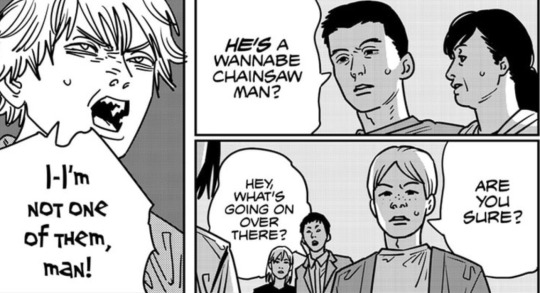
It's normal, he's still bound by the dilemma of the public hunters who have forbidden him to reveal and be Chainsaw Man himself, and above all he's competing with the impostor for his own identity.
Denji isn't THAT scandalized by being pointed out as a wannabe CSM because he is one now, he's been so robbed of his identity that he's almost willing to become himself.
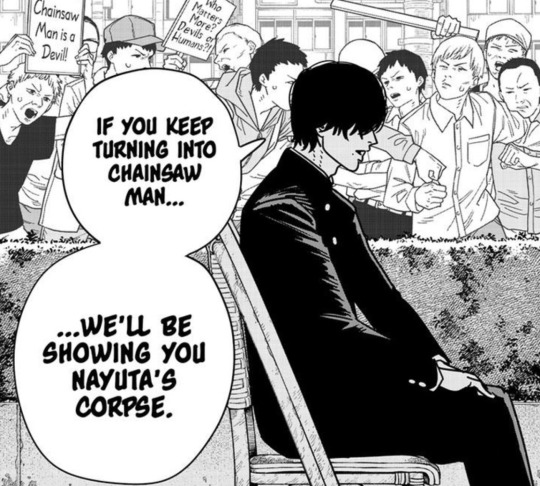
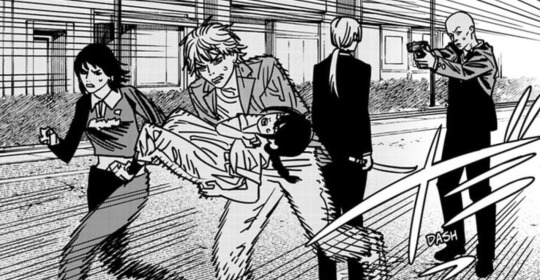
This chapter also hints at the fact that the public hunters don't agree on everything, probably because of a hierarchy or unity game. For example, some hunters only thought that the church was having fun playing CSM, not knowing that it was fighting against the prophecy of Nostradamus.
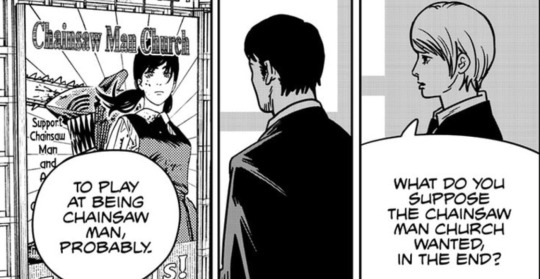

However, this information was gathered by Yoshida through his interview with Fami, but it remained highly confidential. Here again, this public hunter doesn't know that Denji is CSM. In short, information isn't leaking out of the Special Division 7.
Yoshida is the mediator between the public hunters and Denji, but also with the church with Fami. Katana, Quanxi and the possessed man with the dripping brain are the henchmen. Fumiko is the one in charge of preventing any temptation on Denji's part to get closer to the church.
But there's something else that I find even more interesting that follows this point. If we try to untangle everyone's role. We end up with Yoshida; Quanxi; Katana; the possessed one with the overflowing brain; Fumiko; Denji and on the other, on the church side, we have Fami, Barem, Miri, the weapon of the whip, the bow and finally Asa. That's six against six.

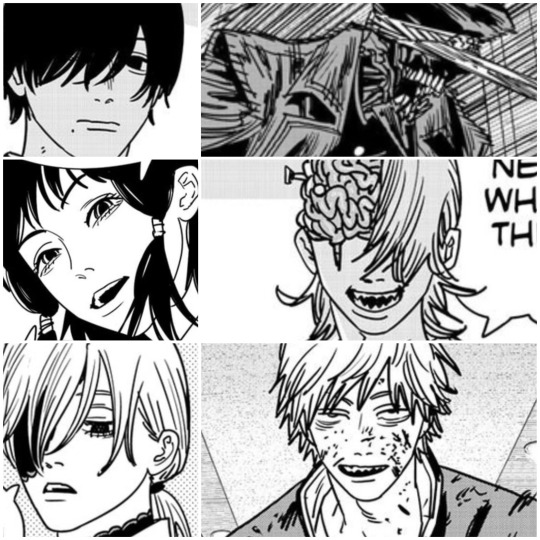
Asa's room is 606. And as I've explained several times, Fujimoto tends to play with numbers in this part 2. So I'm going to try and give you an explanation.

When I saw that not only Quanxi had her arm bruised but Yoshida had sliced Asa's arm, the first thing I thought was "a tie". On one side we have Quanxi losing her arm to protect while on the other we have Yoshida attacking with a slice. The fact remains that an arm has been lost on each side, so there's a certain balance.
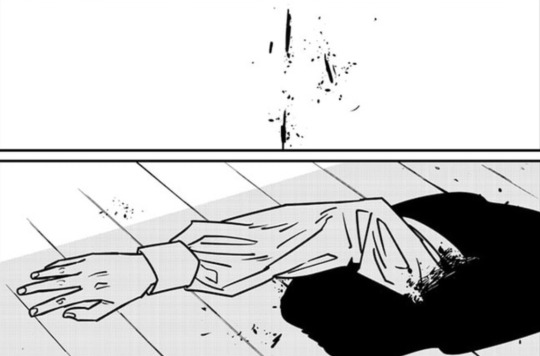
Let me remind you that there are six against six in this game, and nobody has won any points yet, which makes 0.
6 0 6, ball in the middle.
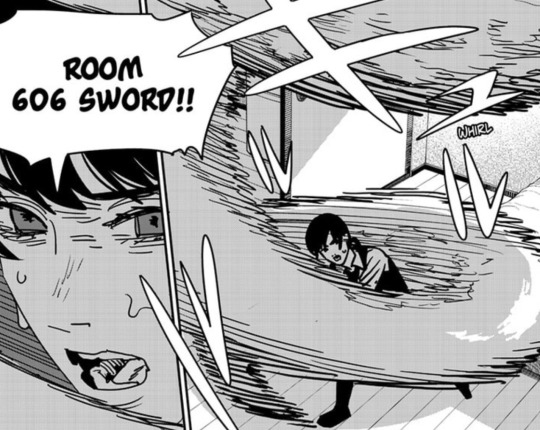
I sincerely believe that what Fujimoto is setting up is a form of game, a war in which we're going to have to keep score.
Barem is called Barem BRIDGE, a card game of 2. against 2. This time it's not just a game about the clan war but the whole manga: Fami and Barem on one side, the demon of Death and maybe Fake! CSM on the other
Did you know that one of the players called himself the dead man? ;))))))
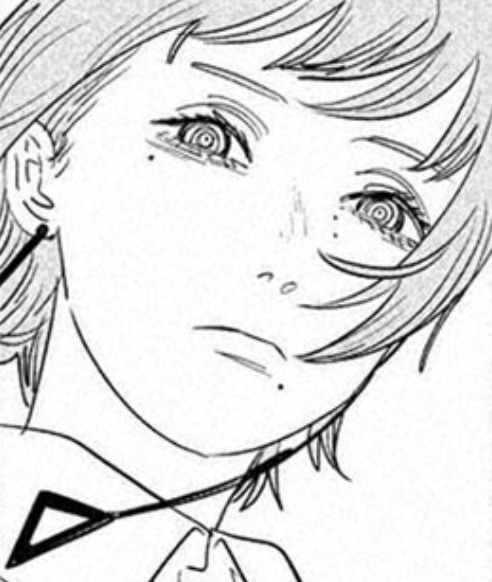
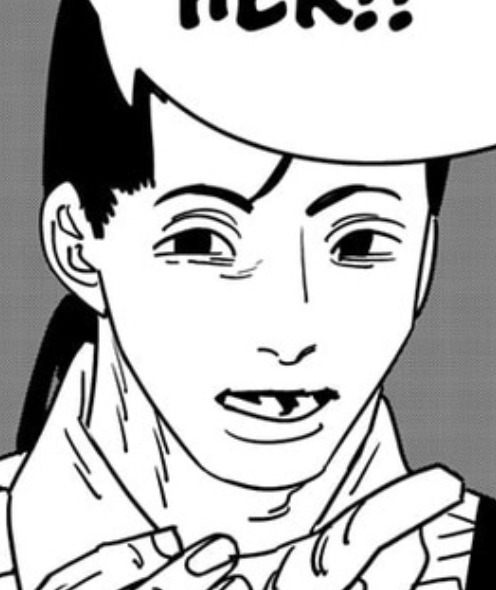
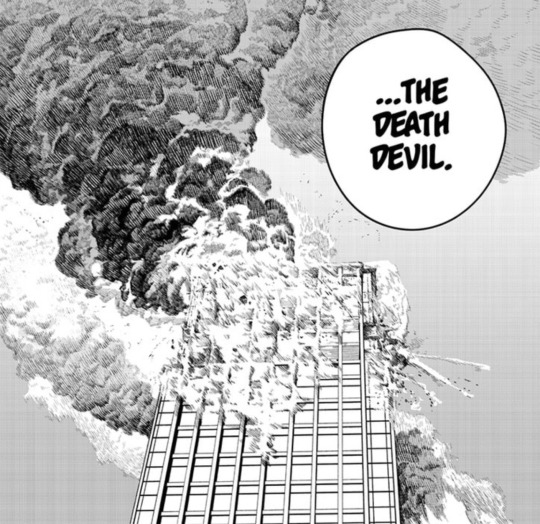

I think the human usurper and fake!CSM are two different entities because the demon has twice interfered with Fami's plan by eliminating the fire demon (Yuko) and saving Denji and Asa.


But it doesn't stop there, so let me come back to a few bridge rules (I don't know how to play, so if I'm wrong, please correct me).
The game opens with the "contract", i.e. declarer commits to making a given number of tricks. Just like the beginning of the game in CSM started with Barem announcing his contract with the fire demon.
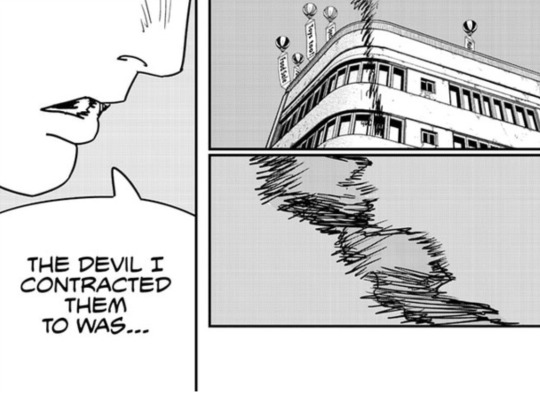

A game of bridge is played in several moves, each move corresponding to a deal. Each player holds 13 cards, which they have arranged in a row to form what is known as their "deck" or "hand". Again, this is not to say that game 2 works exactly like bridge (and its horribly complex rules) but rather to emphasise the symbolism.
Every time one of the sides moves, an injury occurs, a limb is neutralised or even pulverised.


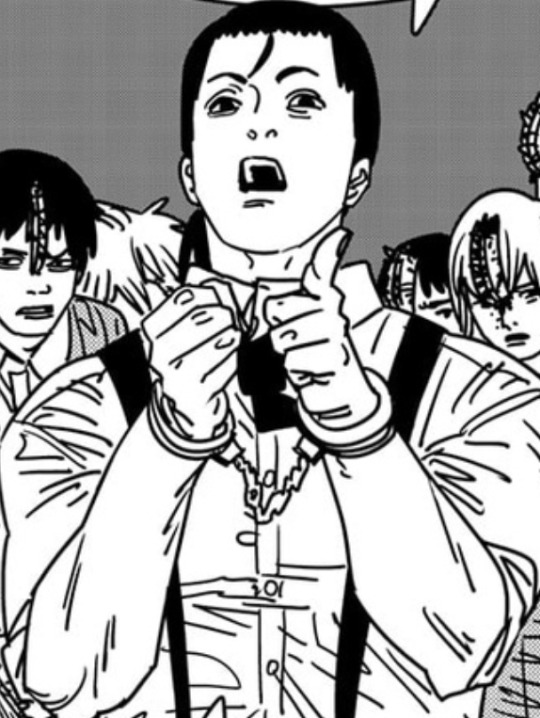

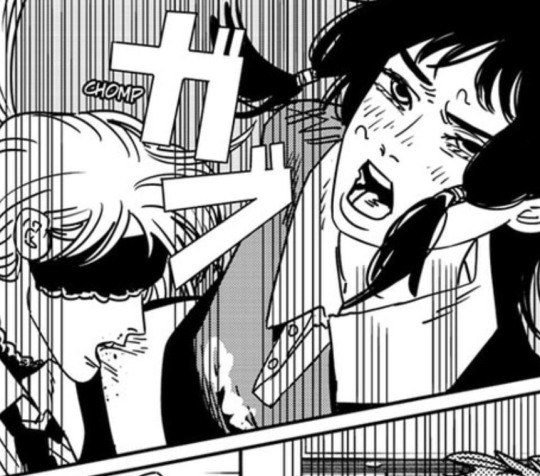
I wanted to end this analysis with the "strong" part of the chapter, Yoru's return in force. I was stuck on the symbolism of the arm, its symbolism in art and its relationship to war.
So much so that I forgot to read the line: Yoru is a team player, she speaks as "we".
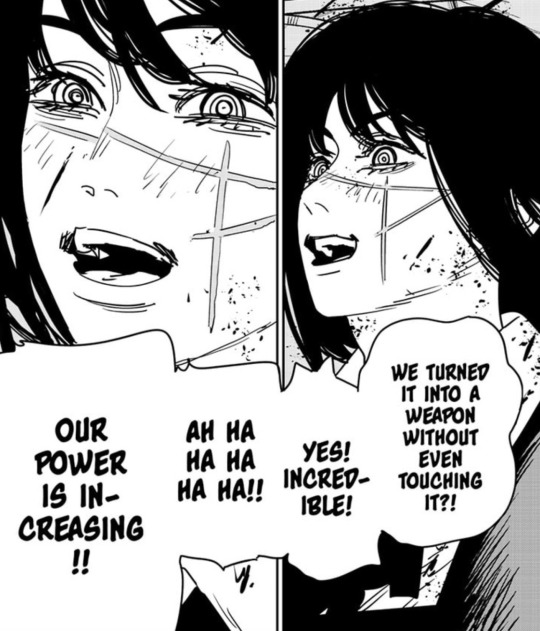
And then everything fell into place.
There's a contrast between Yoru's exaltation and the fact that she's still missing a member.
But everything makes sense with this fusion introduced by the "we".
Yoru is missing nothing, not even an arm, and Asa has become the perfect continuity of her being and her limbs.
Asa may have transformed her flat, her home, but she hasn't lost her bearings, because each of these girls has become the home of the other.

While Denji denies the duality of his being, Asa is embracing it.
While Yoru, even without her arm, feels her strength reaching its peak thanks to her completeness with Asa.
Now, don't you think that making room 606 a weapon whose number symbolizes the status quo is just the beginning of hostilities?
To be obsessed with victory, even if it means leaving your mark, isn't that the definition of waging war?

Or is it just playing a card game ?
#chainsaw man#csm#csm part 2#csm spoilers#csm 148#csm 147#csm 146#csm 143#csm 142#csm 133#csm 128#csm 111#denji hayakawa#nayuta hayakawa#my thoughts#asa mitaka#barem bridge#yoshida hirofumi#fami#death devil#katana man#quanxi#fumiko mifune#Yuko#yoru
314 notes
·
View notes
Text
Danny 'I don't do weird' Pink frustrates me as a character, because I'm honestly not sure whether he was supposed to have an arc or not.
His primary role is as a foil for Clara's arc and, in aid of that, as a mirror to the Doctor. A solider with survivor's guilt and a man of action who can't stand by when people need help etc., in some ways he and the Doctor have a lot in common, but he's also a very grounded and circumspect personality versus the Doctor's being fantastical and adventurous. Danny isn't curious and doesn't want to pursue new things or experiences, instead he wants to be fully present with and grateful for what he already has. The Doctor is incorrigibly curious and always interested in new things.
Danny is someone who desires nothing more than an ordinary life, and looks for beauty and satisfaction in the normal things and people around him. He wants his world to be small and quiet, he values the mundane things others might take for granted. He's normal, patient, dependable, simple, honest, etc. His reaction to trauma hasn't been to disavow the things which lead him to that event, or to seek out stimulation to avoid thinking about it, it's to be thoughtful and cautious and somewhat rigid so he can always apply the mindset and skills he retained from before he was traumatised.
He's very firm and unbending in his worldview and in his self-image. He doesn't seem to ever reassess people once he's decided what he thinks of them. He's not unreasonable or unwilling to compromise, he is in fact maybe too reasonable, but he is implastic. He's extremely even-tempered except for around his identity as a soldier, which he's prickly about, but still pretty quick to let it go as long as he's not being deliberately antagonised.
So anyway Danny represents this other path, and this opposite response to the horror of war and making a catastrophic mistake, but he never learns, he never grows and he and Clara are never much on the same wavelength about anything. He's supposed to be stability, the things she 'should' want, the 'person she's supposed to like', the safe choice, the presentable life which Clara feels like she has to have. He's orderly and ordinary and that's what she wants from him. She has to control her image, her future, and her options.
And their simple relationship, once it exists, functions well as the contrast to her complicated and tumultuous relationship with the Doctor while the companion power dynamic is being dismantled and rebuilt so they can be emotional equals. But like, the set up is confusingly executed.
Listen- they have zero chemistry, they have nothing to talk about and have to resort to talking about work, every conversation goes instantly off the rails, they rub each other the wrong way, there is never any reason for them to keep reconciling and trying again to connect. Like. You are not hitting it off! and keep offending each other bc you're not compatible! Quit!!
Clara is forcing it, that makes complete sense with what she's going through, she's trying to take control of her life and her emotions, trying to prove to herself she's not pining for the Doctor and at the mercy of his whims for her life to be full and complete. She doesn't want to need him or to be dependant on him. She doesn't want to be the heartbroken sadsack whom he abandoned at Christmas or who will take whatever scraps he'll throw her. She wants to control his position in her life and control how she feels about him. Hence her assigning him a specific day and confining their adventures on her own terms. She's trying to keep the Doctor compartmentalised. Having an Appropriate Human Relationship means she's successfully put the Doctor in his box (lol) and neutralised the chaotic power of her feelings for him. I mean, obviously not, but that's what she tells herself.
But what is Danny doing? Why does he keep pursuing this when it's so clearly not a good match?
Again in Listen, and much more so The Caretaker, Danny illustrates that he does not know who Clara is, he's wildly wrong about her and what she's like, and he's very high handed about it as well. He's convinced that the Doctor is taking advantage of her, that the Doctor is domineering in their relationship, that she is not a person who wants to be put into challenging or dangerous positions, that the Doctor is pushing her to takes risks and become a leader where that's not her nature. None of this is true. Clara was always a decisive, assertive, strongly driven person who seeks out new experiences and naturally assumes a leadership role any time that's necessary; she relishes being challenged and facing the unknown. Her blow up with the Doctor wasn't about him 'pushing her too far', it was about him failing to support her when she needed him and condescending to her as a human rather than treating her with the intimacy and equity their bond and history together demands. It's personal and it's about their emotional relationship. It's not about making hard choices, it's about having to make hard choices without her partner being honest with and emotionally available to her.
Clara was always an adventurous person, willing to be spontaneous as long as it's on her terms, and excited by the prospect of authority and responsibility. The danger and challenge isn't an unfortunate side effect or a risk she has to take to see amazing sights, it's part of the appeal. She lied to Danny by omission when she said she went off in the box to 'see wonders', not just because the real reason is that she's in love with Doctor, but also because she doesn't just want to be a tourist. She wants to get involved and save people, she wants things to sometimes go pear shaped. She enjoys and craves that part of it too.
Danny is also wildly wrong about the Doctor, but this is understandable and would be fine except that he's never corrected? He never learns better? What's the point?
In Death in Heaven Danny goes out still wrong about the Doctor, still condemning him cruelly and unfairly while knowing nothing about him. He had a point with some of his original rant, there was actual insight there, but it's buried in assumptions and bitterness and then Danny keeps tripling down on the assumption. The one which doesn't understand that the very thing he's shitting on the Doctor for (being willing to lead and make hard choices that must be made in order to save people) is something the Doctor has in common with Clara. And always has. The Doctor didn't change her or push her into that, that's who she's always been.
What is the point of Danny calling him a blood-soaked general and mocking him, calling him an officer as a pejorative again, and again because the Doctor is trying to save the planet. Like, memory check, that's what Danny is mad about. The Doctor doing everything in his power to save literal billions of lives. Doing it for no reason, out of altruism. Doing it while always trying very hard not to fight or kill anyone. Doing it even at enormous spiritual cost to himself.
I don't understand how we're meant to find Danny sympathetic in that moment, because he comes off like a complete dickhead. And it's all the more frustrating because in the intervening episodes Danny has been eminently reasonable. As I've discussed before, we're exhaustively shown that Danny is 100% okay with what Clara claims is going on, that he doesn't want to get in the way of her friendship with the Doctor, that if it really were only the relationship she's pretending it is, there would be no conflict. He's the one who encourages her to make up with him after Kill the Moon! He tells her to go on travelling and it's fine!
Even when he discovers she's been lying to him and cavorting with the Doctor behind his back (again despite him telling her it was fine with him!), he's calm about it and repeats for the millionth time that all he wants from her is honesty. The truth. Which is the one thing she can't give him because Clara knows their entire relationship is built on the lie, they're only together because of the lie. The truth is, as Moffatt said, that Danny never stood a chance. There is a conflict between the two relationships and she's always going to choose the Doctor.
And that does come out, she gives the whole speech to Danny, not knowing it's him, finally being honest. And he seems unsurprised by it, which makes sense because on some level he definitely always knew ('do you love him?' 'no' 'really had enough of the lies'), but then nothing comes of that. Clara just soldiers on, going right back to pretending this relationship wasn't a façade doomed from the start, and Danny allows her to pretend. He goes off on the Doctor, but not in a way the Doctor actually deserves at all, and just sweeps her confession under the carpet. Letting her get away with it again. True to form, I guess! he always did. But shouldn't we make progress?
And it's like... I hate that he dies on that note. It feels like he dies in denial. I guess you could argue it contributes to his decision to not come back, but that feels like a disservice to the character. Saving the kid is important to Danny, it allows him to atone for his greatest mistake, but he didn't need to change or grow to accomplish that and it doesn't provide any closure to his actual role in the narrative, which was as Clara's foil. Clara is off the hook, free to go on lying to herself about their relationship. It's not addressed in Last Christmas, either, it's only barely hinted at.
#clara oswald#whouffaldi#dw#twelfth doctor#dw meta#I feel a constant need to remind people that the first thing Danny asks after Clara explains who the Doctor is#is 'do you love him?'#it's that transparent#and he asks already knowing the answer and immediately calling bullshit when she denies it#and apparently accepts this as not a threat to him on the basis of the Doctor being an untouchable alien incapable of loving her back#like as if she had a crush on a dragon or the Great Wall of China#I can't tell if that speaks to his lack of self worth or if it's just really patronising#I appreciate In the Forests of the Night so much for the scene where he finally realises he should be jealous#but then he's just Extremely Reasonable about it again#he has total faith in his idea of who Clara is- utter conviction#and it's completely misplaced#I feel owed the psychological fallout from this is all I'm saying#calling this meta is being very generous bc did I even say anything#but whatever it's a bunch of words I'll put it in the box with the other words#I've realised 95% of my whouffaldi meta is in tags on gifsets so
53 notes
·
View notes
Text
Anarchy & Apathy (things we should probably learn from Eurovision 2024)
(tl;dr – a review of the voting process is critical; Croatia should have won)
It’s a rare year that sees a consensual Eurovision winner. It is to be expected – the contest is not only a competition of musical taste, but also of musical identity. There is more than simply genre, melody or vocals at play, as these are often filtered through the lens of national sensibility. At face value, a stereotype of geopolitics; at a deeper level, the actual cultural wealth of each European region. 'Our neighbours', etc. To which of course, theatrics and gimmicks are added, in the hopes of standing out from the rest of the crowd.
This is what makes, or should make, watching Eurovision a positive experience. Which this year, failed spectacularly on all counts, leading to a problematic, underwhelming and polarising edition, derailed on Thursday night and crashing its way through apathy and anarchy all the way to the grand final.
Apathy, because it seemed to want to get away with being apolitical.
Anarchy, because it failed to carry out apolitical acts.
And from each side, its worst attribute, resulting in what feels like a bland and uncomfortable watch.
This year, Eurovision attempted (and in my view, failed) to manage itself by allowing too many paradoxes to take place. Glaring inconsistencies, arbitrary exclusions, aloof silences, inability (or lack of desire) to address core issues and legacy accusations – a broken code. A program in error, glitching and ineffectual, all under the symbolic and literal guise of “neutrality” – which doesn’t stick. And worse, seems to negate the actual positive aspects of the show, this year neutralised themselves.
This isn’t to say Switzerland did or did not deserve the win – the voting conditions of both jury and public are clearly stated, and in theory were applied. The jury voted, the people voted, and the winner was chosen.
But unlike other years where a similar pattern of voting distribution could be considered ‘curious’, and where ‘the safer song’ wins over the public favourite – see Käärijä 2023 – this year’s jury results feel unjust not only to the runner-up, but to the vast majority of contestants. And by extension, the viewers.
Stage presentation was ignored (see UK for the extreme example, and Ireland for a less radical, visually incompatible result).
Vocal performance was ignored (see Norway’s Gunnhild/Gåte for the extreme example, along with Portugal’s Iolanda; Germany’s Isaak, possibly the strongest vocalist in the competition this year; Israel’s Eden Golan for the complete disregard of vocal ability over nationality).
Radio-friendly potential was ignored (see Luxembourg’s ‘Fighter’, Cyprus’ ‘Liar’, Italy’s ‘La Noia’, Austria’s ‘We Will Rave’ even).
Resulting once again, in a surprisingly cohesive jury vote that deems Switzerland’s ‘The Code’ as the winner, over the fifth place that the public attributed it.
Being neutral is not the same as being objective. And while objectivity is difficult to gauge in a contest where musical taste and national identity (not to mention global politics) are part of the formula, there is a case to be made for the fact that Eurovision and the EBU’s passivity and top-up decision making reflects poorly on the Eurovision experience.
Recurring discrepancies between jury and public voting should be addressed. Because a jury’s role (in Eurovision and elsewhere) should not be of neutrality, but of objective action.
In objective action, a contestant cannot be excluded without a proper justification, to date only explained through vague declarations and heavy speculation (see Netherlands).
In objective action, and in a self-identified democratic continent, the people’s paid vote should inform the winning result over a closed group of juries (see Croatia’s disproportionate second place).
In objective action, rules must be enforced equally to all contestants (see Ireland, who had to remove part of their presentation, vs. Portugal, who was allowed to show a message through nails).
And in objective action, microphones should not be silenced; contestants must be allowed the freedom to be judged by the people listening, and not on what the EBU determines should be judged.
Until that’s learned, processed, addressed, reformed – why watch for disappointment?
#eurovision 2024#esc 2024#eurovision#nemo#the code#käärijä#olly alexander#bambie thug#Gåte#iolanda#isaak#eden golan#kaleen#tali#angelina mango#joost klein#baby lasagna
41 notes
·
View notes
Note
After reading the 'Karma x Gakshuu reader' I'm genuinely curious what if the roles were reversed? Amano Gakshuu x Akabane Reader?
Hm, I think I'll answer this ask in a sort of headcanony way, if you don't mind...
Reader pronouns used: they/them

I think a lot of what was key to the original story was the whole 'opposites attract' trope as well as the 'enemies to lovers' theme, and I don't see that changing here.
However, due to Gakushuu being the focus love interest here, I would personally set the whole story in his natural habitat: the Main Campus.
Reader would be a student from E-class, and they would rise up the ranks to join A-class. I don't think most E-class students would want to leave willingly, but I doubt Reader's parents would force them to go, since they didn't seem to care when Karma dropped down.
Therefore, I would have the Principal himself pressure Reader into going to A-class... possibly because they're a great asset to the system due to their high intelligence and talent, and so he wouldn't want to let go of such an asset.
Additionally, I think it would be also a good idea if the Principal wanted to make Reader go to A-class so he can control them. Why? Because reader is stirring up a rebellion. They're talking to their D-class friends who haven't cut Reader off after their drop, and Reader is trying to convince them to drop to E-class, and rebel against the system.
And the Principal can't have that, can he?
So Principal sends Reader to A class, but Reader hasn't had their rebellious spirit quashed yet. They're in class, sure, but they're questioning the teachers, debating with their classmates, encouraging them towards new ways of thinking that don't involve the system, trying to spark a change in the top instead of the bottom, which is not very good for the Principal either.
This is where Gakushuu comes in.
Principal Asano makes it Gakushuu's task to keep Reader under tabs, and to neutralise any trouble they make. Gakushuu does this by making Reader part of the student council, and then promptly drowning in work.
Asshole move much, Gakushuu?
Reader is now hanging out with Gakushuu a lot more, and they get talking as a result. Reader is not happy with him, and there's plenty of passive-aggressiveness, but not nearly as much hostility as there was between Asano!Reader and Karma in the og fic.
Because Reader actually is a bit more compassionate here, and they see Gakushuu as a victim of the system, same as the other kids in Kunugigaoka.
They have plenty of debates and the such, and slowly but surely, Reader begins to change Gakushuu's mind. Emphasis on the slowly, btw. Gakushuu was raised on this philosophy, he's not going to change that easily.
But eventually, he eases up. And things become a lot more fun. Gakushuu gets a little lax on making sure Reader is too busy to start a rebellion, and they get some free time.
During the free time, they both go to Reader's favourite arcade, and despite Gakushuu never having played a single arcade game in his life he is somehow ridiculously good at them? Which pisses off Reader.
Which means they get into a gaming contest.
They spend longer and longer spending time with each other, going to arcades, markets, or just hanging about in general. And it's fun.
Gakushuu begins to think of you as being a little less annoying. Maybe even kind of a friend.
Maybe even something more, but even he doesn't realise that.
It's all fine and dandy and cool and hip and– wait, what do you mean the Principal wants to speak to Gakushuu?
Things are not fine. The Principal has found out about Reader and Gakushuu's trips, and he is NOT happy. And he begins reprimanding Gakushuu.
Oh, but what's this? Gakushuu's arguing back! He's arguing against this whole twisted philosophy of his father's, he's rebelling, he's–
Aaaand the Principal brainwashes Reader. Fuck.
It's fucking terrifying. Reader is not themselves at all, and Gakushuu hates it, hates it hates it. No matter how he shakes you or screams at you, you just keep repeated the Principal's propaganda, a puppet of the system.
He's on the verge of breaking, just like his father wants, but then, he thinks: what would Reader do?
He pretends to submit. For now. The Principal is satisfied, but he keeps you brainwashed. For insurance, he says.
Well, it doesn't matter, because Gakushuu will set you free.
And that he does, when he starts a revolution.
The Principal should have seen it coming; Gakushuu's an amazing orator, but somehow he didn't, and now there's hundereds upon hundreds of students protesting, ripping up exam papers, burning textbooks.
You, in your mind-haze, look upon the chaos, and something stirs in you.
And like that, you're back. Vive la révolution! you shout, before spiking the teacher's coffee machine with extra-hot chilli pepper powder + laxatives. Karma taught you well.
And when all is said and done, and you finally see Gakushuu again at the end of the day, he give you a Big Damn Kiss. Roll credits.
Gakushuu doubts his father would appreciate him coming home after all that, so you let him stay at your place.
Karma is a bit hesitant about letting Gakushuu stay, but you tell him he started the Kunugigaoka Revolution and Karma agrees pretty quickly.
"If you get up to any hanky-pankying, keep it quite, alright?" he says. "I don't want to lost my beauty sleep."
You roundhouse-kick him for that.
Ah, but even at the happy end, there is still one problem.
There's only one bed. Whatever will you and Gakushuu do?

Why is this so long
#assassination classroom#assassination classroom x y/n#assassination classroom x reader#assassination classroom x fem reader#assassination classroom x male reader#gakushuu asano x reader#asano gakushuu#gakushuu asano#asano gakushuu x reader#karma akabane#asano gakuhou#asano gakuho#asano gakuhoe#assassination classroom headcanons
233 notes
·
View notes
Text
My opinion on IDW being canon to Sonic
I watched a video by GamesCage on the topic, who I've been watching a long while on YT before subscribing to him recently on Twitch, and it reminded me of my own thoughts on the matter as well!
But first some preemptive notes because I am entering Sonic discoursespace:
This is just some guy's opinion about a little blue dude! That's it! If you hate it or me personally because of it, I refer you to this image:

I won't ever go into using insulting or uncivil language. But because this is an opinion essay and I got opinions up the wazoo, I'm also not trying to word things in some neutral, disinterested way to appeal to all audiences here
That being said, game-story-wise, we don't fuck with meta-era shit here. I Do Not See It
I'm all for chats and discussions about the topic, agreement or disagreement alike in response to this essay—things just ought to stay civil and respectful. Think of WWSD (What Would Sonic Do?) and the image above
Sonic's morality and what IDW misunderstands of it
Though I respect what the IDW team does (I fondly remember following Evan Stanley's Ghosts of the Future on Deviantart back in the day), I don't prefer their characterisation of Sonic, and that alone is enough to have me a little chagrined as to IDW's integration into the games' canon. I think it's because, ultimately, it detracts from what makes Sonic's character—specifically his morality—unique and appealing to me. Though he isn't nearly as anti-hero in nature as characters like Shadow, Sonic still has moral tendencies that are atypical for characters that occupy the hero role as he's been avowed to have in the games, e.g. being labelled Team Hero with Tails and Knuckles multiple times
To give some sense of signposting, here are the headings of this essay:
Sonic distinctive moral thinking
- The games' simple, reactive Sonic
- IDW's merciful, principles-first Sonic: on freedom and oppression
- Sonic's self-centred in a way, though, right?
The mascot problem
- "What's your idea then, genius?" – the reader reading this
- Why keep things static
- Examples of peak Sonic
Conclusion
Sonic's distinctive moral thinking
To contextualise my judgement of Sonic as distinctive in his moral thinking, I think there is a tendency in Western media to give heroic characters very merciful streaks. Think Superman or Batman—codes of never killing or always offering mercy, often with backstory or informed moral reasoning behind it. While these streaks are understandable, they appear often and thus don't ring as special or particularly unique to me. Sonic has always been interesting to me because he explicitly does not entertain such clear moral principles. His attitudes embodied in his SA2 theme "It Doesn't Matter," Sonic Unleashed, or the Storybook Series (Black Knight being my favourite), show that he just does what he thinks is right and shows no qualms using considerable force (lethal in the case of Black Knight) if he has to against those he thinks are doing wrong—even against people who he would be friends with, like Merlina. He does not barter or reason; he takes action, moves before he thinks, and follows his heart
The games' simple, reactive Sonic
From my interpretation of Sonic regarding mercy, examples from the games show how he isn't interested in rehabilitating or looking for threats to neutralise like some Miguel O'Hedgehog. These tendencies become most apparent when his friends are involved. A standout example is when Amy protects E-102 Gamma from Sonic, convincing Sonic that he isn't like the other badniks. Another, more indirect example is Gemerl, where Sonic fights and subdues him from causing more harm but Tails is the one who reprograms and rehabilitates Gemerl, who lives happily with Cream and Vanilla with his more peaceful disposition. Sonic doesn't go out of his way to help Gemerl post-defeat, but he doesn't doubt or attack him further after his integration either
At heart, I find Sonic to be a reactive, not proactive, hero. He won't go out of his way to check if the day needs saving—he's not a dutiful guardian doing patrol like Knuckles or a principled fighter for an organisation like Shadow—but if Sonic sees someone in need, he won't just pass them by. And I find Sonic's moral judgements to be simple, instinctual, and self-centred in the most literal sense. They come from his bias towards his friends' judgement and what he believes to be right, regardless of how others may judge his actions. I've only mentioned some examples, but they highlight to me that Sonic is neither healer nor hunter. His main priority isn't rehabilitating or reasoning with his foes—he will do what he feels he needs to do, even if that means destroying something or someone for good. But, as Amy for E-102 and Tails and Cream for Gemerl show, he won't go out of his way to make sure threats are dealt with through violence if his friends vouch for them.
IDW's merciful, principles-first Sonic: on freedom and oppression
In IDW, the topic of him showing so much mercy and espousing freedom as an ideal he thinks everyone, even his enemies, deserves makes him much more merciful and deliberate in his mercy than I like him to be. I want to discuss this by briefly expanding on oppression and freedom, a topic that comes up in Surge and Sonic's fight and Surge angrily questions why Sonic wouldn't just end her. Sonic essentially answers it's because he values freedom for all, including his enemies', because he can exercise his freedom to stop them. It's representative of why I think some fans take issue with Sonic's characterisation because it warps how much Sonic might believably value freedom versus oppression on two flops: on philosophical concepts and characterisation.
IDW's concept flop, to me, shows a fundamental misunderstanding on the nature of oppression and freedom, assuming some inherent ranking of freedom above oppression. The two are different things: freedom is a kind of instrument, a means of doing things, a concept that has no content in and of itself. In other words, you have the freedom to do X; having freedom is only meaningful insofar as it enables to do what you want. Oppression, however, is not an instrument in the same way; it makes far less sense to say 'you have the oppression to do X' or 'you are oppressed to do X' like you could for 'freedom' and 'free'. Freedom, precisely because it is an instrument, enables far more flexibility—both good, evil, and neutral acts can arise from it. Oppression is a state of being with an inherently negative core, predicated on suffering and the oppressed being harmed.
Quick and messy take from me on this: freedom for all and oppression for some is worse(!) than freedom for some and oppression for none. But here's something that has a source, leading to the characterisation flop: according to Sonic Adventure's DX Director's Cut manual, the only thing Sonic hates is oppression (for, presumably, anyone). Honestly, you don't even need a game manual to tell you that. I think IDW writers make the mistake of assuming the inverse to be true of Sonic as well: that the thing he loves most is freedom (for, presumably, anyone).
Oppression being the only thing Sonic hates does not mean freedom is the only thing Sonic loves.
It may be notoriously slippery to insist on consistency in the Sonic franchise (or maybe franchises, plural), but this philosophical gloss on freedom and oppression starts to explain why IDW's characterisation strikes me as inherently contradictory to Sonic's preexisting values. Namely, it shows how IDW commits a false equivalence between the two and assigns it to Sonic. Sure, Sonic likes freedom, but that's different to showing mercy and second chances. IDW ends up conflating the two. As a result, IDW has Sonic care more about the principle of freedom than about the feelings and suffering he knows he or his loved ones have gone through. Put another way, it makes little to no sense why Sonic would prioritise freedom for all, even his enemies, when he has been shown to much more consistently put the most weight on what his friends feel and what he himself thinks. IDW does little to no detectable work establishing why Sonic would have such priorities either
Also, not a real argument—just taking things to the extreme in a throwaway thought—but could you imagine Sonic in the beginning of Unleashed actually considering Eggman's pleas saying he's changed and telling Eggman he...values his freedom? Like. c'mon
Sonic's self-centred in a way, though, right?
How about that self-centred angle, though? Sonic's way of thinking is highly independent—he will do what he thinks is right, first and foremost. It would be easy to claim that IDW's characterisation is just a mindset Sonic just holds in the comics, and that alone passes muster; his brand of ethical egoism admittedly does a lot as writerly cover to justify nigh anything about him. Looks like a hedgehog, smells like a hedgehog; chances are it's our hedgehog, right?
I disagree. One: if IDW is considered canon and yet is just so different to what's appealing about Sonic in the games, then the decision to make IDW Sonic canon, to be frank, kinda sucks. That ain't my Sonic—that's some Marvelised-DC version of him trying to moralise that I don't find compelling, distinctive, or endearing.
Two: even if you try to adopt the angle that upholding freedom for all would just be what Sonic believes to be right, it would still be the same as saying Sonic cares more about philosophical ideals than what he sees right in front of him. He's famously poked fun at Knuckles for being gullible before—why is Sonic himself showing that same gullibility and benefit of the doubt towards hostile enemies or those who have notably wrought so much damage to the lives of those he loves?
The trouble is that IDW builds no meaningful narrative foundations on top of which to stake this claim on Sonic's mindset when the games exist. Like, I don't even privilege the games just because they've been around first and for longer (even though, hey, that is true)—he's just cooler in them. Sonic is no philosopher; he's repeatedly shown it's genuinely not that deep when it comes to his moral thinking in the games. All it is is that he has a good heart. As a result, it comes off as a considerable mischaracterisation to show his enemies mercy mostly in the name of freedom or hope for their change (i.e. lofty ideals) compared to something actionable he can do (i.e. kick their ass and break their tech so they don't hurt anyone he cares about again).
The mascot problem
GamesCage mentions a worthwhile point which he calls the mascot problem. Sonic, as a mascot for Sega, has certain narrative lines he cannot cross or change for good. Like with Mario, there is a clear status quo to maintain; for one, Eggman cannot ever truly be vanquished. However, unlike Mario (with the one exception of Super Mario Galaxy), Sonic routinely has narratives that he and his friends undergo. There has to be this delicate balance that Sonic Team, IDW, and anyone writing for Sonic must contend with as a result. You have to write stories—events and plot where characters grow and change and are affected—but maintain the status quo where many fundamental things cannot change
In other words: how do you explain that Sonic never gets rid of Eggman or his other enemies because he, as a company mascot, cannot ever do so?
IDW does this one way by assigning Sonic an inadvertent little philosopher's cap, which I've already opined is a mischaracterisation. It also just generates another kind of untenable narrative problem that's even harder to reconcile: how do you justify that Sonic, hero with a heart of gold, just lets his enemies keep on going for freedom's sake? Arguably, all that does is dress up the mascot problem but with worse consequences—it makes Sonic less likable. It casts him as someone who essentially ends up condoning his enemies' actions, which has already led readers to question his judgement and whether they would even want to root for a character like that when you have an alternative and contradicting blueprint that the games have already provided for him. Like, my boy embodies direct action and IDW turns it into direct-ish-but-hey-do-what-you-want-who-am-I-to-judge action. Dress it up however you want; it's a nerf on who he is
"What's your idea then, genius?" – the reader reading this
In my eyes, what could work for the mascot problem is falling back on the static nature of the characters that have already been long established. The basic formula is there: Eggman is tricksy, proactive, and two steps ahead, but Sonic is always good-hearted enough, reactive enough, and fast enough to catch up by the end.
Elaborating on that formula, you have enough of Sonic's existing characteristics to justify why bad things keep happening despite his presence. He's not like Iron Man, who takes it upon himself to leverage his resources and power to look out for the world when no one's really asked him to. Again, Sonic is a reactive hero; he's not a ruthless hunter and he likes his peace and quiet as well as his adventure. He'll do what he can to fight what's right in front of him but may miss the bigger picture or potential traps by going in too fast. That happened in the beginning of Sonic Unleashed and it made sense. Even in Black Knight, you had him try to whale on King Arthur armed with just a decreasing number of chilli dogs. In an extended or episodic storytelling format, this allows other characters to shine—Tails's powers of analysis, Amy's ability to connect with others emotionally, Knuckles' sense of duty—by contributing to plans and helping Sonic because he has persistent, character-defining flaws. Highlighting his non-proactive and chill nature allows for arcs with more breathing room, too, where the characters aren't going up against some world-ending force or they all hang out. On that front, I'd say IDW has done well giving other characters that spotlight
Briefly touching upon Eggman's characterisation and how that might address the mascot problem, his tried-and-true tendencies should be relied upon, too. He is incredibly intelligent but also a massive narcissist—it makes sense that he has his own sense of short-sightedness where he prioritises and secures his own well-being above all else and underestimates the importance or wrath of godly and natural entities he frequently exploits and disrespects. Because of how strong and distinctive Eggman's brand of narcissism and villainy is, it is honestly fitting that he will never change; that alone explains how often he will cause trouble and will never fully succeed. And that also justifies why Sonic will always be the one to fight him. Both have their imperfections and flaws and that has them in a deadlock.
Why keep things static?
Now, this might bring up the question of static-ness. It might seem like an odd solution to mascot problem to just lean into it. Surely, there has to be greater justification or some potential for change for things to stay interesting, appealing, and compelling for Sonic and his stories.
In response, here's my hot take: ya don't need any of that.
Here's a longer version of my hot take: in any given narrative, Sonic is at his best when he does not grow or change. Sonic is already peak. Others may flounder and oscillate, but he remains steadfast with his heart of gold. He is a pillar of strength. He is static. Think of him in the Sonic Adventure games, characters and humans' reactions to him in Sonic X, the knights of the round table's reactions to him in Black Knight, Chip himself remarking that Sonic has such a good heart that not even the powers of a fucking dark primordial god infecting and transforming him can change who he is on the inside in Unleashed. When unstoppable forces come about, lo and behold, he is the immovable object they meet!
Sonic always stays on the move—that's how you can justify all the amazing, different, wild stories he'll go through, because he is an adventurer at heart. You don't need to humanise a character and subject them to point-A-to-point-B arcs to make them enduring, beloved characters. Just because that's a common format for characters and stories and comics to take nowadays doesn't mean that it's a good fit for Sonic. He's never been one to do something just because everyone else is doing it anyway. I, no joke, think Sonic should be treated like a mythical folklore figure, never-changing and transforming the lives of those he meets before breezing on by—and what figures are more enduring in our consciousness than those of mythology?
And, to refer to IDW, there isn't any need to wax philosophical on top of that. Like I've repeatedly said so far, Sonic is no philosopher (and saying this as someone who did philosophy for undergrad, thank fuck for that). Leave the philosophising and podcast soundbites and video essays to the fans—in fact, I'd even wager the simplicity of Sonic's premise and character, or, hell, even the dissatisfaction that can come from that, is why his fandom even thrives (but that's definitely a separate topic).
Examples of peak Sonic
I forget which interview this was, but Sonic's characterisation was inspired off of Bill Clinton (aged like milk I know; this was before his scandal with Lewinsky), from the idea that actions speak louder than words for him. Obviously, Sonic does get in his quips with his friends and enemies alike, but he's not supposed to be Marvel superhero about it and isn't actually a massive braggart. Even the first episode of Sonic X shows his confidence and demeanour so well—he doesn't need to moralise or talk your ear off for you to know he'll fuck you up. And that's just so much cooler than what IDW accomplishes with their version of Sonic
Like, consider my beloved Murder of StH, which the IDW team had a considerable hand in! Sonic—while recognising that the train is more advanced than other badniks, exhibiting personhood and consciousness—still has the sole objective of destroying the train. Everyone shines and, granted, the format has it so that Sonic doesn't really appear till the end, but he's characterised pitch-perfectly there, instilling so much hope and forward momentum not only in his gameplay but in the heart of the player. Honestly, his late contribution arguably echoes Sonic X, where he often disappears or does his own thing, too
Even in a game or storytelling format where he should be front and centre, you could even explore some big themes with Sonic precisely because of his mental and emotional fortitude! The Storybook Series are so stellar in this regard—you got Sonic helping out Shahra, domestic abuse victim, on dealing with sadness, and him helping Merlina with existentialism and death of all the fucking things. And he doesn't flap his lips about it; he shows it through his actions. He's the protagonist but not in a traditional sense—he's the support and passing through and being unfathomably fuckin cool about it. Any lessons he ends up teaching you is not because he's out to teach you—it's because he's just living his own way and, wouldn't you know it, you just happened to be around for the ride
Conclusion
I'm not excited about IDW Sonic being considered canon because he comes off as an overeager philosopher's take on him when game Sonic is fuckin goated with the sauce. Though the story ideas and arcs in IDW seem cool, Sonic is the heart of the series, and if he's off, then the whole thing ends up a little wonky for my tastes.
To be clear, I don't have issues with different iterations of Sonic as some blanket rule—if the writers do the work to establish why and in what ways Sonic in a particular story is different, then that's just plain fun. Movie Sonic, Sonic Prime, and Sonic Boom are all examples of that. But, above all, the kind of Sonic I adore (and there are in fact many kinds) is the one who you meet and your life is irrevocably changed for the better as he hangs out for a while but never for long. In pivotal moments in the comics, IDW Sonic misses the mark on that for me
Though Sonic Team are making clear moves to integrate all the iterations of Sonic as canon regardless. I do wonder if that, as a move in itself, is the meta-narrative equivalent of Sonic Team changing game-mechanic tacks every game after '06 and Unleashed—a well-intentioned but misguided way to try to appease everyone which I've always thought is the most anti-Sonic thing you can do, but that's just the mascot problem in corporate as opposed to story form.
I was fine with Sonic Twitter just saying 'Everything is canon' as a non-starter – I'll just see how they do what they're intending to do and if I don't like it, then I always got an AO3 account handy
95 notes
·
View notes
Text
Macaulay twins & Thackeray

A nod to Vanity Fair in chpt. 2 makes not much sense at first, though for Richard it must’ve been rather alarming — Rawdon Crawley played cards to fleece his comrades.
However, this association may be a clue to understanding what is happening around the Macaulay twins in Book 2.
The parallel between Charles and Rawdon becomes more clear in retrospect, closer to end of the novel.
Both from respectable families but empty-headed, moneyless and dependent on relatives, they spend time drinking, gambling and screwing around. Both have debts — tend to be overly jealous — get arrested — get involved in love scandal with a rich rival — are ruined but ready to fight — end up in exile.
Yet, the only important thing here is Rawdon's relationship with his wife.
At her brother's elbow Camilla played the role of Becky Sharp in marriage with Rawdon: an attractive young couple that works in tandem, using their charm and wit to take advantage of wealthy friends, and exploiting affections of others to live a better life.
Francis gave some insights into this symbiotic relationship, describing it as 'they like to present a unified front but I don't even know how much they care about each other' (chpt. 8).
When Camilla abandoned this unified front, for Charles it was a betrayal as if she used to be his business partner, not just a lover or family member.
The most notable link to Becky is the role of Clytemnestra, performed by Camilla as well, and the symbolic meaning of it in both novels.
Like Clytemnestra, Becky Sharp is an archetype of a predatory female in disguise of false innocence. Strong-willed, cunning and bold, she’s a skilled actress and manipulator, still unable to predict the consequences of some of her actions.
At some point Camilla makes it clear to Richard that drunk Charles abused her, but Richard is surprisingly angry with her. He questions how Camilla got her injuries, because he feels that something's wrong (chpt. 8).
This situation looks quite peculiar in view of the analogy to Vanity Fair.
Camilla's counterpart, Becky Sharp, complained to her patron Lord Steyne that she experienced all sorts of injustice from Rawdon Crawley (VF chpt. 52). It sounds false, because Rawdon could’ve been a bully with other men, but with Becky he was a meek, submissive husband. All her complaints had only one purpose: to be pitied for her own benefit.
It's unclear to what extent this analogy works, but it may explain why Camilla wanted to put a distance between Richard and Charles. If she lied to Henry, or rather manipulated him, she wouldn't be glad to be exposed: just like in case with Bunny, Richard still was an alarm bell, the first person to whom the one can confide.
Thus she had to neutralise him. And thus she was unable to reconcile Charles and Henry later.
I dare say, Henry had seen what was going on, but he was glad to get rid of the third party in their love triangle anyway. Even Richard doubted his 'good' intentions.
Rawdon Crawley said about his wife: "if she's not guilty, ... she's as bad as guilty" (VF chpt. 55). It might illustrate Charles's point of view as well. Like Becky, his sister didn't want to bet on a losing dog. But even if Camilla had no evil intentions, the consequences of her actions were awful — she opened a Pandora's box.
According to Thackeray, “it is the unwritten part of books that would be most interesting”. And Donna Tartt used this principle full on, leaving all crucial events in shadows, but giving some hints to lead and mislead her reader through carefully constructed cultural references.
Which also can be just some Metahemeralism.
33 notes
·
View notes
Text
Part 2 of - what the heck is going on with Mobius anyway?
S2e3 - the one where Renslayer calls him out on his BS.
Rather like S1e3 there’s actually not that much Mobius in this episode (I mean he’s in the action but we’re not getting that much insight). Non-the-less I managed to stream of consciousness myself through a lot of words….
(1) Mobius is very into his job & is good at it.
Nothing makes Mobius happier than working a case - yes he has fun at the fair but he is always on it: he knows his history of Chicago, he finds the bread crumbs etc - he’s basically showing rookie Loki how to do the good old fashioned leg work). More generally Mobius sees the bigger picture and steers Loki to the decision to get Victor Timely back to the TVA.
(2) Mobius / Renslayer
Because I love Mobius I kind of want to think Mobius is hurt and misses his friend and really wants her back on their side and is genuinely being forgiving and lovely. But - no - I actually think most of the interaction with Ravonna could be read as Mobius being pretty manipulative. We know he can act in a manipulative way after the interrogation scenes in s2e2. He sees the bigger picture and thinks Ravonna / Miss Minutes could be useful or at least he wants to neutralise them. He has not forgotten she tried to kill himself & Loki (mentioned it a couple of times). And he wants to bring back Timely because he thinks “we’ll never get Renslayer to help us” Compared to scenes with Loki Mobius seems pretty in control of his emotions when dealing with her. Ravonna knows him pretty well and doesn’t buy his soft speeches either “none of your words mean a thing”.
I am very interested in what Ravonna meant by her little speech on: “ tidying up your messes - doing your dirty work - making the hard decisions you never had the nerve to make.” Along side the “soft spot for broken things” comment it seems Ravonna has quite a bit of insight into Mobius. In the end Mobius leaves her to Sylvie with only a slight look of regret.
3) order and chaos - opposites - partners
So the order & chaos theme gets overtly introduced by Victor Timely in the loom presentation. The camera pans to Loki and Mobius which is probably not a coincidence. We get the same cut away to Loki and Mobius when Renslayer engages with this theme.
The obvious takeaway is the Renslayer is order and Sylvie chaos given how the scene plays out but the cut aways do seem important.
Then we also have a theme of partnerships.
Timely brings this up first with “I don’t do partnerships”. Others have written very interesting stuff on these themes (@charcubed : https://www.tumblr.com/charcubed/731718717278502912/heres-your-fun-keycode-for-mirroring-in-loki & @loki-who-remains https://www.tumblr.com/loki-who-remains/731775874980069376/the-dichotomy-of-order-and-chaos-is-so- & https://www.tumblr.com/teamtardis-notdead/731724045258817537/all-that-matters-is-order-vs-chaos
From a Mobius pov the options are just Renslayer / Mobius and Loki /Mobius. So order / order and order / chaos. Renslayer / Mobius was a disaster and no more (there is no “we”). But according to Mobius s2e2 “opposites attract? No!”
The future …?
I’ve said before that “Mobius watch” puts him slipping into a pretty dark place from at least S1e4. His partnership with Loki is working very well (possibly too well as others have pointed out). But it seems likely he sees no future in it - it’s a “now” thing. The same with his role at the TVA. He clearly loves that job but has it been rendered meaningless or even plain wrong.
I don’t buy this version of Mobius being content with a regular job on the timeline either - certainly not jet ski salesman - there’s too much of the TVA analyst in him. So what’s left?Of all the characters we have Mobius is least well equipped to deal with the future because he is focused exclusively on now, his main relationship is with Loki (which he does not think will last) and he has ambiguous feelings towards his job with was the only thing giving him meaning. If there’s a sacrifice to be made he’s an obvious candidate - also Renslayer practically calls him out to make a hard choice so no doubt we will see him make one.
So that’s depressing- still at least we’ll get to see Owen Wilson killing it (I am so impressed with him in this show!).
44 notes
·
View notes
Text
A live-action simulation game allowing Israelis to role play as Israeli agents fighting in Gaza's al-Shifa hospital is provoking heated online reactions.
"Fauda: Explosive Lab" is an "escape room" in Tel Aviv, Israel, based on the controversial Israeli Netflix show Fauda. Participants in the game pay to pretend to be Israeli agents sent to Gaza
The game requires them to disguise themselves as Palestinians and make their way to a set that emulates Gaza's al-Shifa hospital.
In a fictional version of the hospital's emergency room, the players use pretend guns to shoot at fake Palestinian fighters attacking them through the windows.
From there, the players must enter a tunnel below the mock al-Shifa, where their mission is to neutralise a chemical bomb bound for Tel Aviv.
The real al-Shifa hospital in the Gaza Strip was subject to a days-long Israeli siege in November that led to numerous civilian casualties, including the deaths of four babies.
The hospital has since faced more attacks. According to a Doctors Without Borders report in late January, the hospital is "badly damaged and barely functional".
Although the Israeli military has claimed since October that Hamas maintained a command and control centre below al-Shifa, it has failed to prove it.
Last week, the International Committee of the Red Cross warned of a "catastrophic" healthcare situation in the Gaza Strip, with only three functional hospitals left in the besieged enclave.
But in Tel Aviv, al-Shifa hospital has become a source of entertainment.
Israelis are "wanting to kick some Arabs' ass", said Arik Turkenich, the businessman behind the popular escape room.
He opened the escape room in 2016 after Fauda debuted on Netflix, but reported that business has been booming since January, with most customers choosing to play the game set in al-Shifa hospital over others.
Visitors to the escape room, Turkenich said, have included Israelis who were evacuated from near the Lebanese border, a unit of Israeli soldiers in uniform, and even a soldier who had recently returned from Gaza on his first night out with his wife.
Turkenich told Forward that he always ensures players complete the mission and win the game.
"Everyone in Israel thinks they're so smart and they, you know, blame the operator if they don't win."
A user on social media platform X, formerly Twitter, slammed the escape room, writing: "There's a lot to say about a start-up culture that continually innovates new grotesques."
#palestine#free palestine#from the river to the sea palestine will be free#anti genocide#free gaza#all eyes on rafah#More links within the article including to Forward if you wanna see the propaganda version
16 notes
·
View notes
Text
Prisoner of Azkaban reread (Part 2)
Chapter 17,18,19,20
The details of how furniture being gouged out makes you think of adolescent werewolf that Remus was (cooped up and aggressive), and why he would enjoy the full moon runs with Marauders. ('best times of his life' as he says. Whatever feelings he has of the near misses, his spirit in Forest Again is "happy to be back in place of adoloscent wanderings". This is important for Remus' characterisation)
Ron standing on a broken leg to yell at Sirius ("if you want to kill harry, you'll have to kill us too!") moves him (show of loyalty? After all of these years?) but also makes him feel guilty: "Lie down. You will damage that leg even more."
Hermione, who was petrified and asking Harry to be quiet - the moment she spots Harry is in danger from Sirius, she kicks the person she was petrified of moments before (book Hermione is nuanced!) XD And Ron throws himself on Sirius' wand hand. Basically Sirius is getting beaten up by kids.
"Going to kill me, Harry?" - ah, Sirius. He feels enormous amount of guilt for their deaths and doesn't deny that he "killed them". Sirius goes completely silent when Harry says, "You never heard her, did you? My mum trying to stop Voldemort from murdering me". He tried to plead his case before Harry said this, and now, he basically hands over the power to Harry in the scene and let Harry do whatever he wants. He even tries to push Crookshanks off, to get him out Harry's wand's way. (Crookshanks' love for Sirius is deeply endearing btw)
I know people focus a lot on the cracks in Sirius and Remus' friendship, but this wordless communication where Remus figures out who was the actual traitor (Sirius doesn't say a word, btw - he just points at Scabbers, and Remus immediately gets it) is… utterly radical after 13 years of suffering.
"Get away from me werewolf" - to show Ron say this, a child from largely progressive Weasley household, is to show deeply prejudiced the wizarding world is.
The fact that Remus is on his side after 12 years, makes Sirius sit on bed with a "shaking hand". It is similar to Remus' voice that was shaking with "suppressed emotion." (Crookshanks goes to comfort Sirius, and goes to his lap)
One of the ways Remus' guilt at not telling about Sirius' animagus form manifested is that he watched Harry on the map, in a way to handle the untoward incidents that may happen himself. (i mean he would have done it regardless, but this is way to keep his secrets as well)
There are two desires in Sirius - the desire to protect Harry, the desire for vengeance against Peter. The stronger desire, we see, even in the smaller moments is to do right by Harry. It is exactly what Remus invokes when Sirius tries to grab Scabbers from Ron - "You owe Harry the truth, Sirius" and he immediately stops struggling.
"My mind seems to be less so when I was with them" - the Marauders granted a very deep-seated need in Remus, a way to experience his wolf as not a terrible monstrous thing, but a source of joy, a way of integrating that self into his identity without shame.
Remus uses "err" when he is minismising the severity of a situation. "Sirius thought it would be - er - amusing to tell Snape.." (adding @urupotter and @thecat-isblogging-blog thoughts on this when we discussed )
Also, Hermione's role as an advocate in these chapters begins here - she asks Remus the right questions, and she will continue to do so in coming chapters, making sure everyone's story is heard. It is in keeping with the book's ideas of justice and mercy - and while Hermione is the advocate, Harry is the deliverer of justice - one who decides what to do.
Chapter 19 - POA
Snape having to play nursemaid by bringing Lups his goblet of Wolfsbane would not have endeared Lups to him. XD (But it also shows Snape's gritted teeth approach to things he considers danger and how to neutralise that danger)
Snape's first set of dialogue is "I told Headmaster again and again you have been helping Black into castle..". Translation: My father figure that I unfortunately projected onto has been dismissing my feelings and my concerns and now I can spitefully show him the proof. ("I will be very interested to see how Dumbledore takes this")
And Remus lets his anger show up more openly and it is cold and dismissive: "You fool. Is a schoolboy grudge worth putting an innocent man back inside Azkaban?"
Hermione tries to advocate for Lups, saying he should be heard. This is her role in the chapter - when Harry is too emotional and Ron is too confused, she takes over as the advocate in the chapter, while Harry is the judge.
Harry sees that Snape is beyond reason, so he decides to follow Hermione's lead and advocate for Lups instead.
"You would have died like your father too arrogant to believe that he was mistaken in Black" hints to what Snape is feeling in this scene, not to mention being inside the Shrieking Shack where he was sent by Sirius once as a trick, make him regress even more. (Also he dies in Shrieking Shack in Deathly Hallows)
When Snape threatens Harry, "Get out of the way or I will make you" - the trio try to disarm him at once and he gets knocked out. I love Ron and Hermione don't hesitate to do this (even though Hermione panics, "we attacked a teacher"). They are truly ride or die for Harry.
Sirius breaks, and Remus in response "gets a steely note" in his voice ("give me that rat"). The moment Peter appears, Remus will begin to grow colder and colder in the scene.
"His wet eyes seemed to be burning into his face". "fathomless eyes" "sunken eyes suddenly overbright". There is so much emphasis on Sirius' eyes for his emotion - even in GOF, his eyes "shuttered" when talking about his imprisonment. Such a powerful description of his energy and emotionality. It makes you feel his presence as a character.
"Well hello Peter, long time no see" "You might have missed finer points when you have been squeaking around on bed" LMAO. the passive aggression in this man.
Voldemort's closest supporters, most likely the Lestranges, are aware that Peter is the informant. Not everyone seems to be aware - Snape clearly isnt. This is to show hierarchy within Death Eaters. There is also an implication that Lucius may be aware - which is fun again when you look at power dynamics in his "friendship" with Snape. The implication in DH is that Lucius took him under his wing, something that Snape is clearly grateful for (he reacts unconsciously to him being named as DE in GOF), but Snape is not in on the Chamber of Secrets plot, nor about Peter. Also Snape is working against the Malfoys. So many criss-crossing loyalties. XD
"Throat too tight to speak, Harry nodded." - an indication that Harry is near tears too.
Remus rolling up sleeves to get ready to kill Peter. What a gentleman.
When Peter speaks to Harry, Sirius loses it. And then when Peter invokes James to manipulate Harry is when Remus comes forward along with Sirius to throw Peter to the floor. (it's a subtle detail because Remus is quiet and asking polite-sarcastic questions - but it shows how angry he is). For me, the interesting part about Remus' behaviour in the chapter is that he is already on Sirius' side without question. So all the questions he is asking Peter is almost like he is working up his rage more and more.
"You should have died, died rather than betray your friends, as we would have done for you!" "You should have realised, if Voldemort didnt kill you - we would." Sirius is talking about the loyalty Peter refused to show (that they would have showed), and Remus is doling out what would be the expected punishment for that lack of loyalty: "Goodbye Peter"
I am in awe of the fact that Sirius, who was in prison for 12 years and has much right to decide what to do with Peter as much as Harry does, immediately hands over the decision to Harry when Harry asks it. And even when Sirius is threatening Peter, "if you transform, we will kill you", he checks with Harry, "you agree Harry?"
The chapter ends with this sentence, "Crookshanks led the way out of the room, his bottle brush tail held jauntily high." LOL, he has been vindicated!
Chapter 20 - POA
the awkward way Sirius offers Harry a home. He is so unsure! He dominates the scenes of previous chapter, and he is a powerful personality despite being pretty much a walking corpse with alive eyes. And then he turns into something very endearing, when he is all: "of course I though you wouldnt want to -I understand. I just thought-"
And then - when Harry assures him he wants to live with him, "Sirius' gaunt face broke into the first true smile Harry had seen upon it. The difference made it startling, as though a person ten years youngers was shining through the starved mask" . I imprinted on this relationship right then and there, and there is no other dynamic that moves me as much as this in the series.
Harry gropes in the mist for Sirius' arm, and grabs onto him when Dementors come. "They werent going to take him". Adding link to my meta which explains in more detail the beginning of the intense bond between Harry and Sirius.
Chapter 21
Madam Pomfrey having a chocolate the size of a boulder that she has to break apart with the hammer. XD And then she tries to shut Harry up by forcing a chocolate down his throat.
"You surely dont believe a word of Black's story?" "Sirius Black proved he was capable of murder at 16. You havent forgotten he tried to kill me?" Ah, Snape. Dumbledore is siding with Marauders again in his head, and that, among other things, will trigger his final lash out.
Harry understands Dumbles' broader intention (fly Buckbeak to Sirius' window) and Hermione thinks of bigger plans: "If we steal him now, the committee is going to think Hagrid set him free." And Harry spots immediate threats: the werewolf that might run right at them.
"How can you stand this? How can you stand watching it happen?" - Harry doesnt know how to not act. It is one of the reasons in Deathly hallows that when he decides to not go after the wand, it is the scariest thing he had done in his life. He could not remember not acting.
"Get your filthy hands off it" - Harry's dislike for Snape deepened in this book, and gains even more personal edge than before. (it is also in reaction to Harry's anger when Snape suggests they have been confunded. "We' re not confunded!" Harry roars)
"Where are you Dad? Come on" : Harry realising he had seen himself, but conjures a Patronus in the shape of his father's Animagus form is just poetry. Legit one of the most beautiful moments in the series. (And Harry realised… "Prongs," he whispered). This book is also the most contained and stand alone when it comes to Harry's development.
Chapter 22 - POA
It is interesting here that Dumbledore is a bit amused by Snape's meltdown, Snape incensed - but by middle of GOF, their dynamic develops to this ("Sometimes I think we Sort too soon"). It was pointed out by econteacher on discord about how Barty Crouch Jnr as FakeMoody would play this book's fracture against Dumbledore and Snape, since they dont seem to be properly communicating in GOF ("Dumbledore happens to trust me. I refuse to believe he gave you permission to check my office" and how Jnr arrives at the scene of his father's murder: "Snape said something about Crouch."). The Dumbledore-Snape relationship is reaffirmed and repaired by end of GOF book, by Snape's show of loyalty to Dumbledore in front of Fudge (where Snape straight up shows his Dark Mark to Fudge to stop him from mouthing off Dumbledore), and him going to Voldemort on Dumbledore's orders.
Lups confirming to Hagrid he didn't eat anything in the night points to interesting stuff about his memory when he is transformed.
Lups wanting to leave as quickly as possible because he feels he has let down Dumbledore - by keeping Sirius' animagus form a secret back in school to now, and the fact he was loose on the grounds in the night.
Ron takes Pidwidgeon out of harm's way when he notices Crookshanks eyeing him. XD And then he gets Crookshanks to sniff him. "What do you reckon? Definitely an owl?" this moment is so adorable. Crookshanks purrs, and Ron decides, "Thats good enough for me"
"I only hoped to get a glimpse of you before starting my journey " ahhhhhh kill meee
Sirius gifting Ron an owl as an apology of what he put him through.
Harry threatening Vernon cheerfully with Sirius name rofl "He's a convicted murderer, but he's broken out of wizard prison and is on the run. He likes to keep in touch with me though.. keep up with my news.. check I'm happy"
POA ends on such a bittersweet hopeful note.
64 notes
·
View notes
Text
THEORY- SPOILERS FOR CHAPTER 62
Noe is Krusnik, Hi and welcome to my crack theory on Noe is Krusnik, But in a different timeline. Take it a step further and claim that Vanitas and Dominique were originally meant to be villains in the tale.
Why did i come to this very odd and strange theory? im glad you asked! behold! chapter 62 of vanitas no carte.
Krusnik is referred to as 4 things. Kind, Brave, cool, and Slightly foolish. Do you know what Noe is? Kind, Brave, and foolish. Krusnik went about solving crimes between humans and vampires, Noe and Vanitas are now moving into doing just that with their newest mission.
Noe's backstory has the makings of every protagonist ever, dead family, dead guardians, sold on the market. But there's one thing that stood out to me, The mention that Krusnik had golden eyes that had the ability to neutralise vamperic abilities and powers.
Now i know, silly me, Noe doesn't have golden eyes, he has red! oh yes, I know, but can we be sure? after all, when we are introduced to little Noe he didn't have a bandage over his eye when he met his 'grandparents' the bandage only came during his time with the trafficers, but there is something important to note here.
Conflicting information, Dominique says that her Grandfather bought Noe because Noe was up for auction as an 'Archiviste survivior' However the people who took him were human traffickers, who were not aware that Noe was a vampire. When they found out, we were never told, However, If he was Krusnik, it would make sense as to why the teacher would be in the audience, (He KNEW Noe would be there) and if Noe was sold to a vampire, and the vampire tried to take a bite, he could of accidentally triggered the neutralisation, which in turn made the teacher buy him, little Noe wouldn't know how to turn it off, and so the teacher bandaged his eye that stayed gold till it eventually faded away.
This would also explain why in recent chapters Noe has started to REMEMBER what happened between him and Ruthvan without Ruthvans consent because Ruthvan used a vampiric ability on him but for someone who can neutralise said ability it would have little to no effect over time. And with Noe being Noe when the teacher told him Archivisites had different abilities to that of regular vampires he most likely never brought it up again thinking that was one of the abilities or didnt even realize he had done that.
In turn the teachers allowing Noe to read the Adventures of Krusnik, Is essencially what he did with letting Louis 'find' his reports to read. Letting Noe read how his life should of ended up and seeing if he would catch on.
Vanitas in the early chapters reads alott like a villian, to the point it is hard to ignore and oyu could see how easily if Noe wasnt friends with him during some of these scenes that he would easily turn agaisnt or persecute him.
Domi too is part of the De Sade family and judging by their torture booth at the masqueade ball, they are very clearly not good people (apart form her) but even see has no problem threatening to tear Vanitas apart if he tries to hurt Noe. Because without Noe, Domique would of eaisly of fallen into the villian role like the rest of her family. The teacher was the one who took in Louis, Had he not her fmaily would of executed him themselves, she would of known he was her twin and left alone in that family with no outside influence, its easy to see she could of easily became a villian, that whole interaction between her and vanitas in chapter 8 is so Villian vs Villian coded that now i cannot read it any other way. But slowly over time these 'villian' like moments become less and less, because Noe is more prominant in both of their lives,
Not to mention Vanitas was from a traveling circus originally, one that suspiciously enough makes me think of charlten, Had to. stuck around and not been rescued he could of easily became one of the pawns of charleten.
Vanitas dies at the end of the tale, because it is his fate to. Noe was always meant to kill him. One way or another. friend or foe.
#vanitas no carte#the case study of vanitas#vanitas#vanitas anime#vanoe#vanitas no carte manga#memoir of vanitas#vanoe fanfic#vanitas no carte theory
18 notes
·
View notes
Text
Nye review: Michael Sheen stars in a surreal take on the NHS origin story
It would have been so easy to make Nye a straightforward hero story: Michael Sheen resplendent in the title role of the underdog son of a miner smashing political elitism to found the NHS. Instead, Sheen spends this intriguing, dream-like play shuffling about a hospital barefoot in baggy pyjamas, haunted by flashbacks to the morphine highs of his career.
Writer Tim Price and outgoing National Theatre artistic director Rufus Norris have turned this welfare state origin story into a weird, sometimes baggy reverie, enlivened with poignant biographical insights. At first, Sheen is touchingly delighted to be treated by the public health system he helped dream into existence, a vision as beautiful as the sunny-hued daffodils on each bedside table. But the mood soon darkens as he’s lost in post-operative hallucinations: the sadistic schoolteacher who beat him for his stammer, the black lung-afflicted miner father who – ironically – he couldn’t or wouldn’t help.
It’s a bit of a tired theatrical set-up, to have an ageing famous figure reliving his life in convenient vignettes. But although the text periodically sags, Norris’s direction keeps things nimble and strange. Nye’s first trip to the library is a thing of wonder, with Beauty and the Beast-style living bookshelves.
beckoning him into a world of learning. The town council meeting where he makes his first, Revolutionary France-inspired political manoeuvres unfolds on tables made of hospital beds, patients still in them.
Accordingly, Sheen plays Nye with a touchingly boy-like sense of gentleness and wonder: but sometimes this performance is at odds with what we’re told about this obstreperous, stubborn, womanising political operator. It’s hard to believe that his wife Jennie Lee (Sharon Small) would surrender her own political career to him, or that postwar PM Clement Atlee (a sinuous Stephanie Jacob) would see him as such a dangerous rival that the only way to neutralise him was to give him the Minister for Health and Housing.
The actual founding of the NHS feels like a rushed misstep here, too. Nye’s showdowns with the doctors are staged a bit like he’s confronting an intergalactic alien council, their looming masked faces dehumanising the actual people who make the NHS possible. The coda is hurried, too, with an underexamined, unfair-feeling scene that suggesting Jennie Lee was to blame the political failures of Bevan’s later years.
Norris and Price are clearly reluctant to end on a note that feels too heartwarming, too rousing. This is the polar opposite of the NHS section in the 2012 Olympic opening ceremony, all happy kids bouncing on hospital beds in pyjamas. But sometimes, it’s hard not to wish for a bit more of that optimism –for an insight into the postwar mindset shift that turned socialism from a quaint minority interest into an urgent, collective political mission. Instead, Nye‘s emotional punch comes from its hushed parallels with the present day, where the NHS – like its founder – lies sick in bed, battling for its life.
7 notes
·
View notes
Note
I really hope William does something soon to neutralise these two treacherous TWATS. I’m so f’ing sick of their shite. The absolute desperation they elicit is mortifying.
The royal role playing is absurd.
They "fled for their very lives" from this racist royal family but sure...let's act royal so we can get attention and make money.
19 notes
·
View notes
Note
Your idea of Knuckles meeting the End is so interesting. The parallels between The End wanting order and Knuckles being the Guardian of something that’s the opposite of the Chaos Emerald are so good! Like the End manipulating the kid who’s never had interaction with other people and convincing him that it’s correct and Knuckles ending up so different from the knuckles we know.
I have sooo many ideas about this. I don't think The End really tries to be manipulative, it bluntly states what it believes as fact, and a young Knuckles may easily be drawn in by its words. He may be eager for any form of companionship, clinging desperately to its words in hopes that its presence doesn't go away.
Maybe it does not see Knuckles as capable of freeing it, and instead tries to sway him into seeing the world the way it does. It speaks of the chaotic nature of life, and how its purpose is to bring it to order, to instill eternal peace. Life is unpredictable, is painful, messy. Non-existence is safe, numb, uniform. It would ignore any of the good parts of life and go on about the negatives. Hearing nothing but negatives would eventually wear Knuckles down, without anyone else to provide a more positive perspective.
Maybe Knuckles mistakenly makes the connection that the existence of the Master Emerald, and his role as its guardian, is evidence that The End's ideas are accurate. If life, chaos, is a purely good thing, then why does it need a neutralising force? Why does it need a leash?
The Master Emerald exists for a reason. He alone can command its power, can tame the untameable. Perhaps he was destined to do more than simply guard...
#mm. ive got a lotta ideas im just rly bad at execution#also im not sure what the ending of this would be. having knuckles end up as the end 2.0 sounds boring#maybe hes not. uh. genocidal.#maybe he takes its 'teachings' in his own way. maybe he agrees with its ideas but not its methods.#maybe he reaches an age where the end thinks hes capable of freeing it now#and thinks it has him completely subservient to it#but he says no. hes not letting it murder everyone. he'll bring about peace in his own way#leaves it trapped there#idk ive gotta sit down and plan this out lol#knuckles the echidna#sonic frontiers the end
21 notes
·
View notes
Text
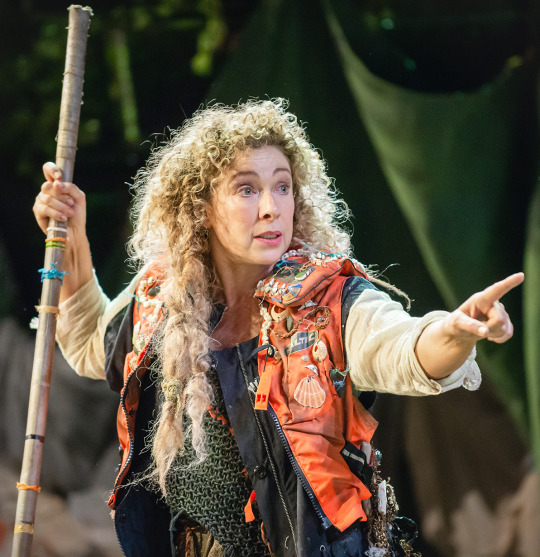


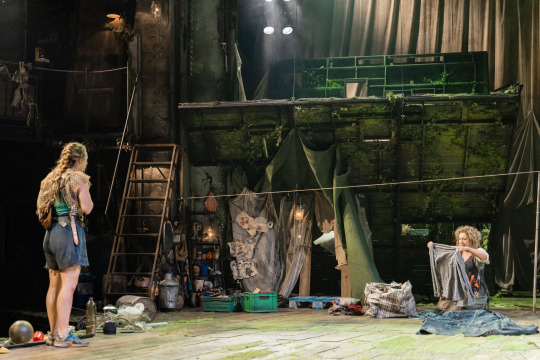
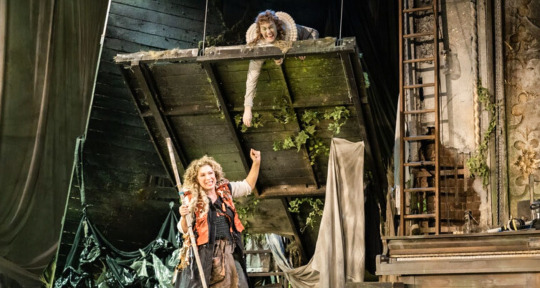
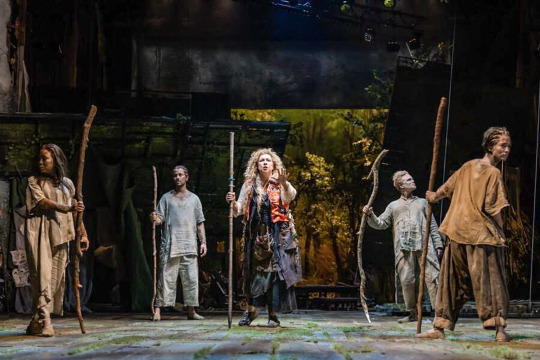
REVIEW: THE TEMPEST: Alex Kingston is a magnificent Prospero
Royal Shakespeare Company, Stratford-upon-Avon
If there were prizes for inventive recycling of props, this RSC staging would get the soup-tin statuette. Oil drums are rolled to illustrate anecdotes, drunkards quaff from petrol cans and Ariel’s flute is twisted together from plumbing pipes. With references to “the quality of the climate” and “mutinous winds”, The Tempest sustains director Elizabeth Freestone’s contemporary interpretation with little strain, helped by the opening storm being made by man. Or, in this version, woman. Alex Kingston’s Prospero, though still an exiled “duke” of Milan, is mother to a daughter. This affects the text, neutralising Shakespeare’s “farther” puns and forcing recounts in Miranda’s lines about how many men she saw before Sebastian, while Prospero’s rather creepy concern with the security of Miranda’s hymen feels unlikely from a bohemian modern mother. Gender-stubbornness about Shakespearean roles would have robbed us of great Lears from Glenda Jackson and Kathryn Hunter, and also of Kingston’s magnificent, revelatory Prospero. “Our revels now are ended” and “this rough magic I here abjure”, the soliloquies disavowing super-powers, are often played as elegiac farewells, but from Kingston feel closer to Christ at Gethsemane, a war between two natures. This Prospero rages against the dying of her might. Heledd Gwynn’s Ariel, hair and makeup channelling Aladdin Sane, is alternately punchy, touching and tuneful until a spectacularly athletic exit. A very modern staging that is fundamentally true to the text and the RSC’s intellectual, rigorous, clear-speaking traditions. At the Royal Shakespeare theatre, Stratford-upon-Avon, until 4 March.
#Alex Kingston#Kingston Edit#Royal Shakespeare Theatre#Shakespeare#The Tempest#Threatre#2023#Royal Shakespeare Company#Threatre Review#OMG It's Moll Hair ��
41 notes
·
View notes
Text
I just now finished Good Omens 2 (very late I know) and…look, I don’t like ending because I don’t like being harpooned in the chest, but I do think it’s necessary to go down this path and it was a brave choice.
Aziraphale is *incredibly* conditioned by Heaven and even after Armageddon he never lost it, which, I mean, for a human being brought up in a cult would be understandable, let alone a being who was within one for 6000 years. If he and Crowley are to have a chance to be together as they are, complete in each other without their backgrounds getting in the way, Aziraphale’s conditioning needs to be completely smashed to pieces. He needs to see Heaven for what it is with eyes unclouded.
I think that’s why Gabriel and Beelzebub got there quicker; as leaders they had to be aware of what their respective machines actually were to be effective in their roles, and that made it easier for them to realise what they found in each other couldn’t compare. Someone as low down on the totem pole as Aziraphale wouldn’t have the chance to know, plus doubt or questions of any kind were forcefully discouraged.
I’m hoping that the Metatron’s plan to neutralise Crowley and Aziraphale will backfire in his stupid smug face next season, with Aziraphale finally, *finally* seeing Heaven for the evil that it is.
Anyway. My point is don’t hate Aziraphale please he’s suffering too much already 🥺
Also I am forcing myself not to think too much about how devastating all this must be for Crowley otherwise I’ll spend the rest of the night crying and I have work in the morning
17 notes
·
View notes